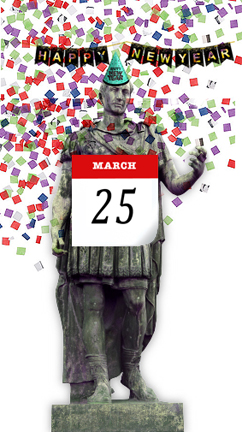 It is March 24. Will you be celebrating New Year’s Eve
tonight? Did you know that until 1752, the calendar ended on March 24 and began
on March 25? That would make tomorrow the first day of 2023!
It is March 24. Will you be celebrating New Year’s Eve
tonight? Did you know that until 1752, the calendar ended on March 24 and began
on March 25? That would make tomorrow the first day of 2023!
Julius Caesar came up with the Julian calendar in 45 BC. Up
to that time, most calendars were lunar calendars and dates were measured by
cycles of the moon. Caesar came up with a 12 month calendar that was based on a
solar calendar. The Julian calendar began the new year on March 25. Several
months were named from their position in conjunction with the March new year
(you may know that in Latin, September means seventh month, October means
eighth month, November means ninth month and December means tenth month.)
Since the Romans were in charge of most of Europe, the
Julian calendar was used until 1582. That is when it was discovered that the
solar year had been miscalculated and everything was off by ten days. So Pope
Gregory XIII authorized a new calendar that made adjustments. It started the
year on January 1 and shaved ten days off of October 1582 so the year would
align with the proper position of the earth rotating around the sun. The
problem was fixed, except it wasn’t. You see, not everyone recognized the
Catholic Pope’s authority to mess with the calendar, particularly Protestants
in England. That would have been easy enough to let the Brits do their own
calendar if it just involved a small country. However, the British had
colonized a lot of the world. So there were two calendars in use at the same
time, with two different starting dates for the beginning of the year. How long
did this last? 170 years! Finally, in 1752, the British conceded and, by act of
Parliament, they adopted the Gregorian calendar, along with its January 1 New
Year’s Day. Here is what they had to do to make the calendars line up.
• They made 1751 a nine-month year. It began on
March 25 and ended on December 31.
• They eliminated September 3-13, 1752 to get the
calendar back in line with the solar year.
• They adjusted everyone’s important dates. Until
this change happened, people listed dates with two different years in the first
three months of the year (March 24, 2021-22 if we were still on the two
calendar system since the Gregorian new year has already happened, but the
Julian new year is tomorrow!) Here is a tidbit of information I ran across:
George Washington had been born on February 11, 1731 in the old Julian
calendar, which was February 22, 1732 in the adjusted Gregorian calendar. His
birthdate was changed to reflect the new calendar.
Confusion led to the big change in the calendar in 1752.
Fixing it has helped us all keep the date straight ever since. What is
confusing to your customers? Effective marketing takes the confusion out of
complicated business processes. How does this happen? Let me give you three ways it is done in
marketing.
First, effective branding makes complicated things simple to
understand. For instance, there is a very complicated explanation of how crude
oil is refined to make gasoline. There is a further complicated explanation of
octane levels and the rating system for each grade of gasoline. The energy
industry has simplified it to help me understand that I am paying for Regular
or Premium gasoline. I don’t need to know how they achieved it, I just
need a simple explanation that is defined
in a word or two. Someone decided to simplify it for me. The same is true of
your business. If you effectively brand your process, it makes it much easier
on your consumers to understand.
Second, effective marketing solves problems. Your marketing
should focus on the solution to problems. Much like Pope Gregory tried to do
with his calendar, your marketing should sell the way to make life easier.
That leads to the third way marketing takes confusion off
the table: it effectively communicates with its target audience. This is where
Gregory needed help. "I am in charge so you will change” is not an effective
marketing communication message. What Gregory needed was a counterpart who
could sell the idea of a new calendar to people who were not in the Vatican fan
club. It would have saved 170 years of the two calendar system. If you want to
take the confusion out of your business communications, you have to have the
right person (or medium) speaking to your target market.
Tomorrow is a new day. No, it is not New Year’s Day – at least
not anymore. But it could be the day you decide to realign your marketing to
make what you do much more understandable to your customers.
---------------
The 1752 Calendar Change, CT State Library, March11, 2022